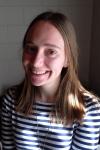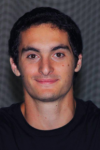People
 |
Hedy Kober, Ph.D.Email: hedy.kober@yale.edu
Hedy received her Ph.D. in Psychology with a focus on Cognitive and Affective Neuroscience from Columbia University in 2009. She also recently completed a respecialization in Clinical Psychology. She is an Associate Professor of Psychiatry and Psychology with additional appointments in the Neuroscience and Cognitive Neuroscience programs. She uses affective/clinical/translational neuroscience approaches to investigate self regulation broadly - with a specific focus on psychopathology and especially substance use disorders. She then uses the insights from this research to develop, test, and improve interventions (with an emphasis on cognitive-behavioral and mindfulness-based approaches). |
 |
Elise DeVito, Ph.D.Email: elise.devito@yale.edu
|
|
 |
David Saunders, M.D., Ph.D.Email: david.saunders@yale.edu
David obtained his MD at Weill Cornell Medical School (WCMC) and his PhD in Religion at Emory University under John Dunne, with a specific focus on Buddhist meditation theory and philosophy of mind. He was a clinical and research fellow in the Albert J. Solnit Integrated Training Program and a postdoctoral fellow in the lab. He is now an Assistant Professor of Psychiatry at Columbia University, and is still an integral part of our lab. Along with Dr. Kober and others, he is developing and running a clinical trial evaluating Mindfulness-Based ADHD Treatment for Children (MBAT-C). |
|
 |
Corey Roos, Ph.D.Email: corey.roos@yale.edu Dr. Roos received his Ph.D. in Clinical Psychology from University of New Mexico in 2018. He is Assistant Professor of Psychiatry and a licensed clinical psychologist. His research focuses on mindfulness-based interventions for substance use disorders, web- and app-based interventions, self-regulation strategies, patient-treatment matching, and harm reduction. |
 |
Jochen WeberJochen is our brilliant go-to Neuroscience Elf. He primarily works as a Senior Data Analyst at Memorial Sloan Kettering Cancer Center, one of the main contributors to the ISIC Archive. For us, he brings his all-around elfin magic and special expertise in mathematics, programming and prior work experience to assist with data analysis and visualization. His prior work experience include working as the senior imaging analyst at the SCN lab at Columbia University, where he continued to develop NeuroElf, a Matlab toolbox for fMRI data analysis and visualization, as well as working in the Core Facility of the Interdisciplinary Center for Clinical Research at the RWTH Aachen in Germany, and a customer support agent for Brain Innovation, the makers of BrainVoyager QX. |
 |
Reuma Gadassi-Polack, P.h.DEmail: reuma.gadassipolack@yale.edu Reuma received her doctoral degree in Psychology from Bar-Ilan University, and her M.A. in Educational and Clinical Child Psychology from the Hebrew University of Jerusalem. Reuma’s research focuses on the affective and interpersonal aspects of depression and personality disorders. She is currently working on projects investigating role of emotion regulation in the development of depression and other disorders. To approach these questions she uses various methods, including cognitive tasks, experience-sampling methods, and brain imaging. |
|
 |
Nicholas HarpNick is interested in the links between mind-body wellness and affective experience. For instance, he has studied how physical activity and mindfulness-based interventions relate to affective bias, and he is interested in further exploring how physical activity or mindfulness interventions might reduce craving or negative affect in substance use disorders. He is also interested in the brain basis underlying such effects. For instance, he is currently using functional magnetic resonance imaging (fMRI) to examine patterns of brain activity associated with clinically relevant outcomes (e.g., relapse in substance use disorders) in the service of improving treatments. |
|
 |
Maria Christina CrouchEmail: maria.crouch@yale.edu Maria Christina Crouch (Deg Hit’an and Coahuiltecan), PhD, is a clinical-community psychologist and an NIAAA F32 postdoctoral research fellow at Yale University. Her program of research is focused on the intersection of trauma-informed care, evidence-based practices, and practice-based evidence (Indigenous approaches) to address alcohol and drug issues, trauma, and related health impacts of social determinants among American Indian and Alaska Native communities from a cultural, strengths-based approach. |
|
 |
Adam MorrisAdam Morris is a postdoc in the Crockett Lab and the Kober lab. He recently finished his PhD in cognitive science at Harvard University. During his PhD, he studied “habits of thought” in decision-making: habitual cognitive mechanisms which guide abstract thought patterns and decision operations. He is currently investigating people’s awareness of their own implicit choice mechanisms, and the ways that this awareness can be improved through attentional training, such as mindfulness training. |
 |
Iya Hanik, B.S., B.A.Email: iya.hanik@yale.edu Iya is a full-time research assistant in the CAN lab. She graduated from Temple University with a double major in Neuroscience (B.S.) and Psychology (B.A.) in 2019. She has previously worked on decision making with a focus on impulsivity along with substances of abuse’s effect on white matter tracts. Her interests include the neural mechanisms of addictive behaviors and clinical intervention methods. |
|
 |
Jodie Hung, B.S.Jodie is a full-time research assistant in the CAN lab. She graduated from Carnegie Mellon University with a major in Psychology and a concentration in Clinical Psychology in 2023. In undergrad, she worked in labs that conducted research on mindfulness and alcohol use disorders, and completed her senior honors thesis on self-report measures of alcohol craving. In her spare time, she enjoys rockclimbing and singing. |
|
 |
Maya John, B.S.Maya John is a full-time postgraduate associate in the CAN lab. She graduated from Yale University with a B.S. in psychology in 2023. In undergrad, she worked at the CAN lab to help develop digital clinical interventions targeting symptoms of craving, anxiety, and depression. For her senior thesis, Maya ran an RCT of a single-session self-compassion and mindfulness-based intervention that she developed. In the future, Maya hopes to pursue a graduate degree in clinical psychology, combining clinical practice and digital intervention development. |
|
 |
Kaiqi Zhang, M.A.Email: kaiqi.zhang@yale.edu Kaiqi is a full-time research assistant in the CAN lab. He graduated from New York University (B.A.) with a major in Psychology and a minor in Music, and Teachers College, Columbia University (M.A.) with a major in Clinical Psychology and a concentration in Neuropsychology. His research interests center around the neuro mechanism and cognitive factors of mental health disorders, as well as developing and evaluating treatments. In his free time, he enjoys listening to and composing classical music, playing tennis, making coffee and tea, and reading random news/articles. |
 |
Savannah EastlerSavannah Eastler is a sophomore in Pauli Murray college studying Cognitive Science. She is interested in meditation, sports psychology, lucid dreaming, and the hard problem of consciousness. In her free time, she enjoys rock climbing and cross stitching. |
|
 |
Priyanka JainPriyanka Jain is a sophomore in Ezra Stiles college currently studying History of Science, Medicine, and Public Health. She is currently a pre-med student, who would like to eventually go into fields of neuroscience or psychiatry. Priyanka also works as a spin-instructor at Payne Whitney Gym, and works at the HAVEN Clinic on the weekends. |
|
 |
Abigail TarekegnAbigail Tarekegn is a sophomore in Branford College majoring in Cognitive Science. Her research interests include mindfulness, emotion regulation, communication, and cultural psychology. In her spare time, she enjoys playing the cello and reading. |
 |
Maggie Mae Mell, Ph.D.Maggie Mae was a full time research assistant in the CAN lab. She received her B.A. in Psychology from Rutgers University in 2005. She is currently pursuing her PhD in Neuroscience. |
|
 |
Wendy Sun, B.S.Wendy majored in Neuroscience at Yale (class of 2018), and was a Postgraduate Research Associate at CAN lab. She is currently persuing her MD-PhD at Harvard University. |
|
 |
Ross MacLean, Ph.D.Ross earned his Ph.D. in Clinical Psychology from Pennsylvania State University in 2015. He is currently an Advanced Fellow in Mental Illness Research, Education, and Clinical Center (MIRECC) at the VA Connecticut Healthcare System and Yale University. His research is focused on identifying neurobiological and behavioral mechanisms involved in the maintenance and treatment of addiction. |
|
 |
Matthew SchaferMatthew was a full time research assistant in the CAN lab. He received his B.A. in Psychology from William & Mary in 2014. His interests include cognition-emotion interaction, mindfulness and social cognition. He is currently pursuing a Neuroscience Ph.D. at Mount Sinai. |
|
 |
Shosuke Suzuki, B.S.Shosuke was a full time research assistant in the CAN lab. He graduated from UCLA with a B.S. in Neuroscience in 2014. He is currently pursuing his Ph.D. at Emory University. |
|
 |
Bethany Goodhue, B.A.Bethany was a full time research assistant in the CAN lab. She received her B.A. in Psychology from Yale in 2016. She is now persuing her Ph.D. at University of South Florida. |
|
 |
Reuben Hendler, M.D.Reuben was a full time research assistant in the CAN lab. He received his degree in cognitive science from Calhoun College at Yale in 2014. He is interested in the psychology of living well – how the mind assigns ethical and moral value and produces feelings of meaningfulness and fulfillment. He practices meditation and hopes to study its potential use in cultivating mental habits conducive to human flourishing. He is also interested in how emotion regulation techniques may be skillfully implemented in light of heuristics for evaluating experience like the “ends-and-peaks” rule. |
|
 |
Darby HenryDarby was a Cognitive Science major in Pierson College. As an undergraduate research assistant in the CAN lab, she helped work on a couple super cool meta-analysis related to the neural mechanisms underlying craving and the significance of craving in addiction. |
|
 |
Joseph Taylor, M.D., Ph.D.Joe earned his MD and PhD in Neuroscience from the Medical University of South Carolina. Broadly, Joe’s research focuses on pairing brain stimulation techniques with brain imaging techniques in order to map and modulate the aberrant neural networks associated with refractory psychiatric and neurological symptoms. |
|
 |
Nilofar Vafaie, M.S.Email: nilo.vafay@yale.edu Nilo is a research associate at CAN Lab. She graduated with a Master’s in Biomedical Engineering from Northwestern University. Her interests include the neural and cognitive bases of emotion dysregulation and their role in the development and maintenance of psychopathology, as well as computational psychiatry, meta-analyses, and mindfulness. |
|
 |
Hailey YetmanHailey is an Neuroscience major in Davenport College (class of 2020). As an undergraduate research assistant, she has worked on a meta-analysis that models how cue reactivity and craving affect treatment outcomes. Now, she is working on a study that examines the efficacy of brief training on ability to regulate craving and subsequent substance use. Broadly, Hailey is interested in neural mechanisms behind disorders and disabilities and intends on pursuing medical school. |
|
 |
Uri Berger, Ph.D.Uri Berger was a Postdoctoral Fellow in the CAN lab. He received his doctoral degree in Psychology from Bar-Ilan University. His M.A. degrees in psychology (experimental and clinical) are from the universities of Bar-ilan and Tel-Aviv. Uri’s past focus was on the origins of social disgust. Currently he is working on a project investigating the role of craving in binge drinking. Specifically, he will examine the effects of regulation of craving training (ROC-T) on young adults who binge drink. To approach these questions he will use various methods, including cognitive tasks, affective-related tasks, and brain imaging. |
|
 |
Jessica Mollick, Ph.D.Email: jessica.mollick@yale.edu Jessica is interested in the brain mechanisms involved in learning and decision making, and the role that neuromodulatory systems such as dopamine play in these tasks. Her research focuses on computational neural network models of the basal ganglia, amygdala and dopamine system, with a particular focus on expanding those models to look at the role of dopamine and the basal ganglia in negative valence learning and understanding the brain mechanisms that drive prediction errors for worse than expected outcomes. She has applied these models to a variety of learning tasks. Her empirical research focuses on fMRI, using a conditioned inhibition experiment with juice rewards that draws on worse than expected prediction errors, and involves applying temporal-differences learning and neural network models to this experiment, as well as a pain learning task, to assess the fit of these different models to fMRI data in dopaminergic and subcortical regions. She is interested in comparing the fit of different models with empirical data, and looking at how evaluation of reward and punishment outcomes relates to addictive behaviors. |
|
 |
Sophy Xiong, B.S., B.A.Email: yihan.xiong@yale.edu Sophy (Yihan) Xiong is a full time research assistant in the CAN lab. Sophy graduated from UCLA (Class of 2018) with a double major in Psychobiology (B.S.) and Linguistics (B.A.). She has previously worked on the neurogenetics of autism, and novel treatments for anxiety and depression. Her current interests include the neural correlates of addictive mechanisms, and of clinical interventions for SUD. When she is not in lab, she can be found salsa dancing, trapeze flying, theater acting, or taking a nap. |
|
 |
Rob PalmerEmail: rob.palmer@yale.edu Rob is a medical student at Yale (class of 2021) who’s helping with the CAN Lab’s research on mindfulness and CBT interventions for craving regulation in people trying to reduce or quit smoking. He has previously contributed to research on ibogaine and 5-MeO-DMT for the treatment of concerning opioid use as well as on research at the University of Southern California that involved fMRI and EEG imaging of long-term meditators. He hopes that he will–before he graduates from medical school–help conduct research that explores the effects of mindfulness interventions on implicit bias. |
|
 |
Stephanie MaltaStephanie is a junior in Morse College from Miami, Florida majoring in Neuroscience. Her current research interests include emotion, addictive behaviors, gender differences and public health applications. Outside of lab, you can usually find her reading or at an a cappella performance. |
|
 |
Lili MargitaiLili is a Neuroscience major in Branford College (class of 2020). She has worked on a study that analyzed the regulation of craving in heavy drinkers [CTNA] and on a study that looks at how stress affects heavy smokers’ ability to regulate their cravings [ROC-Shock]. Now, she is working on a smoking cessation randomized controlled trial (RCT) neuroimaging study [PDC3]. |
|
 |
Daniel RiceDanny is a Cognitive Science major in Jonathan Edwards College (class of 2020). He has worked on a study looking at the effects of stress on regulation of nicotine cravings [ROC-Shock], and a meta-analysis modeling how cue reactivity and craving affect treatment outcomes. Now, he is working on a smoking cessation randomized controlled trial (RCT) neuro-imaging study [PDC3]. More than anything, he’s just happy to be here. |
|
 |
Taylor SpadoryTaylor received her B.S. in Psychology from Yale (class of 2021) and is currently a master’s student at the Yale School of Public Health in the Department of Social and Behavioral Sciences. She has worked on a variety of projects at CANLab, including an ongoing clinical trial testing the efficacy of regulation of craving training on heavy drinking in young adults, as well as a meta-analysis examining the effects of negative emotions on eating and weight. Her research interests include neural mechanisms behind disordered and addictive behaviors, with specific focus on eating and substance use. |
|
Geraldine Hernandez-Marin |
||
Jennifer Wang |
||
 |
Kiran DamodaranKiran is a senior in Pauli Murray College majoring in Economics and English. His research interests include neural mechanisms of addiction and change, adolescent addiction and treatment, and emotion regulation. In his free time, he loves writing poetry and playing soccer, lacrosse, and guitar. |
|
 |
Audrey EdelmanAudrey Edelman is a full-time Postgraduate Associate for both Dr. Hedy Kober’s Clinical & Affective Neuroscience Lab and Dr. Jutta Joormann’s Affect Regulation & Cognition Lab. Audrey graduated with a bachelor’s degree in psychology from Simmons University in 2019 and joined the CAN Lab in spring of 2021. She primarily works on coordinating an NIH-funded fMRI study which investigates the impact of maternal depression history on child emotion regulation. Her main research interests include child emotion regulation, risk factors for internalizing disorders, and psychopathology in the family context. Audrey hopes to go on to pursue a graduate degree in clinical psychology to continue studying these topics. |
|
 |
Doyoung JeongDoyoung graduated from Yale in 2022 with a B.S. in Neuroscience and English. Doyoung has been part of various projects at CAN Lab and explored topics such as negative affect, stress, and food cravings. She is currently working on a meta-analysis examining the relationship between negative emotions and drug use. |
|
 |
Jennifer OkoloJennifer is a junior in Trumbull College majoring in Cognitive Science on the pre-med track. She has previously contributed to research involving spinal cord injuries and neural regeneration. Her current research interests include craving regulation, substance use disorder interventions, mindfulness, and emotional regulation. |
|
 |
Sophie Shang, M.S.Email: fei.shang@yale.edu Sophie (Fei) Shang is a full time research assistant in the CAN lab. Sophie graduated from University College London with a Master of Research in Cognitive Neuroscience. Previously, she went to UC Berkeley and double majored in Cognitive Science and Psychology. She studies the cognitive and affective processes underlying major psychiatric disorders using computational modeling, behavioral testing and neuroimaging. Her current interests include the neural correlates of addictive mechanisms, and clinical intervention methods. |
|
 |
Astra ToyipAstra is a senior in Benjamin Franklin college majoring in Neuroscience on the pre-med track. She has previously contributed to research involving reward prediction errors in substance use disorders as well as the role of mindfulness interventions. Currently, she is working on her senior thesis project with the CAN lab looking at the neural correlates of wins and losses in individuals with substance use or gambling disorders. |
|
 |
Osaru Uwa-OmedeOsaru Uwa-Omede is a sophomore in Davenport college studying Neuroscience on the pre-med track. Her research interests include addiction, emotion regulation, and memory, especially in relation to dreaming. |
|
 |
Daniel Wang, B.A.Email: daniel.wang.dw758@yale.edu Daniel is a full-time research assistant in the CAN lab. He graduated from UC Berkeley with a B.A. in Cognitive Science in 2019. He has primary research experience utilizing sparse coding neural networks to up-sample computational fluid dynamics simulations, and he has research experience with qualitative psychology research studying how narrative identity is formed in adolescents and is influenced by socio-contextual factors. His interests include understanding the neural mechanisms behind addictive behaviors, emotional regulation, and development of clinical treatments. |
 |
Bodhi |
|
 |
Gaia |


